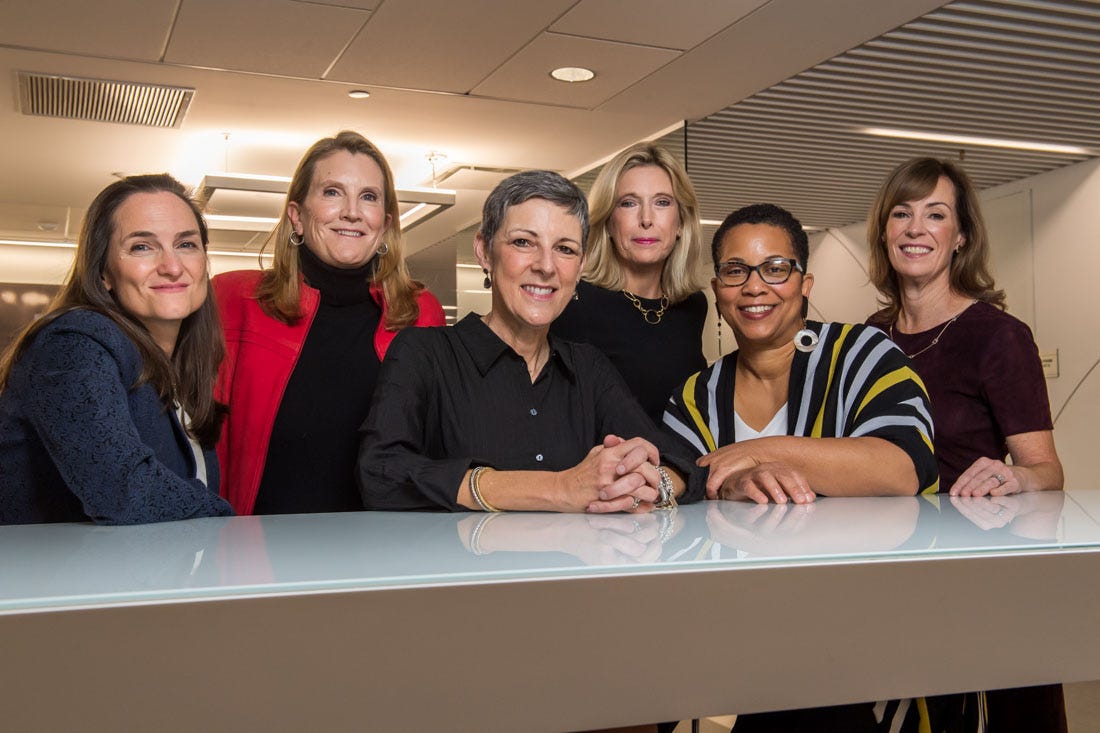When Your Manager Says, ‘You Should Smile More’
Don't fume. Fight back with the help of a new guide for handling the most common gender-based micro-aggressions in the workplace.
You’re the only woman in the room, and you're asked to take notes.
Your male colleague is praised for leaving work early to attend his daughter’s swim meet. (You are not.)
A new client assumes you are a junior employee. (You are not.)
Your boss tells you, “You should smile more.”
If you’re a woman who has worked in corporate America for a few years, chances are you’ve encountered one of these slights, or one like it.
Now, a new book wants to help women—and, crucially, their managers and coworkers—fight back against these gender-based micro-aggressions. It was written by six women execs—Dawn Hudson, Angelique Bellmer Krembs, Katie Lacey, Lori Tauber Marcus, Cie Nicholson, and Mitzi Short—who had worked at PepsiCo together earlier in their careers. One night, when they were all catching up over dinner with former PepsiCo CEO Indra Nooyi, they realized many of their “funny” memories centered on the slights they had encountered throughout their careers because they were women. Though the #MeToo movement has helped women fight back against egregious cases of sexual harassment, the group of current and former C-suite leaders felt like no one had yet addressed gender-based micro-aggressions in a similar and substantive way.
“We realized the way to meet the moment was to use our collective voices, our power and our access, to try and accelerate change,” says co-author Lori Tauber Marcus, one of the co-authors. Now a corporate board director and executive coach, Lori’s resume includes stints as CMO of The Children’s Place Retail Stores and Interim Global CMO of Peloton Interactive. The six women dubbed themselves The Band of Sisters, interviewed dozens of professionals (both women and men) and penned You Should Smile More: How to Dismantle Gender Bias in the Workplace.
From left to right: Angelique Bellmer Krembs, Cie Nicholson, Lori Tauber Marcus, Dawn Hudson, Mitzi Short, and Katie Lacey, otherwise known as The Band of Sisters
You’d be hard pressed to find a group better prepared to tackle the topic. Together, their resumes cover 29 industries, and, as the book notes, the execs “have seen it all, from the bottom rung to the boardroom.” But they didn’t want to write a guide aimed just at women. “No one needs another book where we tell women how they can just solve the problem themselves,” Lori says.
Instead, the book breaks down some of the most common instances of gender-based bias in the workplace, and provides a script for everyone involved, from the woman on the receiving end of the offense, to managers and bystanders. “I don't think men get up in the morning and say, ‘I'm going to undermine Lori by asking her to take notes in the meeting.’ I think it’s truly unconscious. People don't realize that they're doing it,” she explains. ”In the book, we assume positive intent on the part of men bosses and bystanders, but make clear: Ignorance is not OK, because there's a byproduct of ignorance.”
The byproduct of that bias could be a big reason why women are leaving their jobs. A Deloitte report found that over half of women want to leave their employer in the next two years, and only 10% plan to stay with their current employer for more than five years. I chatted with Lori about why that’s a big problem for everyone, especially employers.
As for what to do when your manager tells you to smile? “If they say you don’t smile enough, say, ‘Can you elaborate on that? I don’t smile enough compared to whom?’ You can also assume positive intent and assume there is something productive in the feedback,” Lori writes in the book. “Try saying, ‘Can you please give me an example of that behavior? When you saw it and what its impact was on the situation.’ Sometimes you’ll find out you may have some blind spots tracking your impact on others. When that’s not the case, the person giving you this feedback will be forced to think through the impact of your actions.”
Q: Have you ever been told you should smile more?
A: I've been told variations of that. I've been told I'm too intense, and I'm too passionate. I also get the opposite. I'm often told I'm too friendly. I'm too open. When I was an operating executive in corporate America, I was told that I needed to make myself a little bit less accessible. I needed more gravitas. It’s another example of lazy language that is focused on style, and not the impact of your actions.
Q: Right. There’s a constant balancing act women have to perform in the workplace. If you tilt too far in one direction, you're too nice. Tilt too far in the other direction, and you're a bitch. It’s a huge emotional burden.
A: You're constantly performing. I like the analogy to gymnastics. Women are trying to do our routine from a balance beam, while people in the majority—cisgender white men—are doing their routine from the mat. It’s much easier to do a cartwheel on the mat than the balance beam. There’s a very narrowly acceptable band of behavior for women. Be assertive but not aggressive. Speak up but don’t be shrill. How do you perform at your best if you can't bring your full self to work? That's an added burden women face.
Q: There are sadly still too many barriers for women in the workplace. What inspired the focus on micro-aggressions?
A: This is an area that's very insidious. It almost sounds like you're being petty when you say things like, ‘I hate when I go to an offsite and I’m always given an extra large men’s T-shirt. That makes me feel like you're not thinking about me.’ Or, ‘I’m always asked to get the cupcakes for Secretary’s Day.’ The thing is, one at a time it might not be a big deal, but little by little, day in and day out, it just serves to exhaust us, at a minimum. Collectively, these are bricks on the shoulders of women.
Q: Exactly. Psychologists often call it “death by a thousand cuts.” Why should corporate leaders care about micro-aggressions in the workplace?
A: They chip away at the culture companies are trying to build. Companies spend so much time and money trying to do big things for culture—ping pong tables, cold brew, elaborate offsites, town halls that recognize people. There’s definitely a war for talent right now. We are all vying to attract, retain and engage talented workers. And if you're going to have a workforce of the future, it has to have a diverse population. Companies have to figure out how to create a culture focused on making people feel like they’re included and that their voices matter. And these little things matter in terms of people feeling like they belong.
Q: Are you optimistic that companies are creating a culture where this kind of bias is less common?
A: I don't think we are near being there yet. And I don't think there's enough momentum that it's going to happen whether I focus on it or not. I’m cautiously optimistic. I was on a podcast a few weeks ago, and the person who interviewed us made such an astute point. She said, ‘So to stop these micro-aggressions, people just need to make micro changes.’ I love that. We aren’t changing the trajectory of climate change or fixing the roads. Those are hard things. As a boss or a bystander, the changes that you can make aren't very hard. The fixes can be small and high impact. That's the part that makes me optimistic.
ATTEND OUR SUMMIT:
It's time to step into all that you are meant to be, flourishing at home and in the workplace.
Women are a crucial component of building a better future—but working families aren't getting the support they need at home or at work. Childcare costs are skyrocketing, women are shouldering a disproportionate share of domestic duties and too few employers are making the necessary changes to enable employed caregivers get ahead at work.
We will examine innovative and sustainable solutions that are giving us hope and identify what women and working families need from partners, employers and society at large. And finally, we will network, find community and look towards the future with hope as we navigate a rapidly changing landscape at home, in the workplace and in our society.
Join us November 4th in Brooklyn, New York. Early bird tickets are now available!
DOWNLOAD OUR LATEST TOOLKIT:
The rise of flexible work has sparked a demand for flexible child care, from part-time sitters to nanny shares and more. But which works for your family? Use our handy guide, sponsored by the experts at Care.com, to figure out the best flexible arrangement to fit your needs. Download our latest toolkit, for free!
GET 1-ON-1 ADVICE:
Nicole Meyer is a Certified Nutrition Coach, cookbook author, wellness entrepreneur, and TV personality living in New York with her two kids and bernadoodle, Rocco. She helps corporate professionals lose stubborn weight without feeling like you’re on a diet or out of control around food. Whether you’re a corporate professional or employer looking to foster a healthy corporate culture for employees, Nicole can help you increase productivity, drive and wellbeing. Book Nicole today!
LOVE TO SEE IT
President Biden’s plan to tackle student loan debt is a big win for women, since women hold two-thirds of student debt in the U.S. It takes women about two years longer than men to repay their student loans, Fortune reports. Biden’s plan would cancel up to $10,000 in federal student loan debt for millions of borrowers across the U.S., and an additional $10,000 for Pell Grant recipients.
Astronaut Nicole Aunapu Mann, of the Wailacki of the Round Valley Indian Tribes, will be the first Native woman to travel to space. She will be mission commander for Nasa’s next trip to the International Space Station on September 29 and responsible for all phases of flight, according to the BBC.
HATE TO SEE IT
Companies are cutting back on maternity and paternity leave, according to the Wall Street Journal. The share of employers offering paid maternity leave beyond what is required by law dropped to 35% this year, down from 53% in 2020, according to the Society for Human Resource Management. Paternity leave fell to 27% in 2022, down from 44% in 2020.









